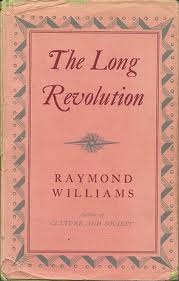This article is missing information about the title subject, the book, itself—it's scope, content, background, and publication history, which are altogether, with already appearing content, unsummarised by the article's lead.(May 2025) |
 First edition | |
| Author | Raymond Williams |
|---|---|
| Language | English |
| Genre | Cultural studies |
| Publisher | Chatto & Windus |
Publication date | 1961 |
| Media type | Print (book) |
| ISBN | 0-14-020762-7 |
| OCLC | 12448133 |
The Long Revolution is a 1961 book by Raymond Williams.[ not verified in body ]